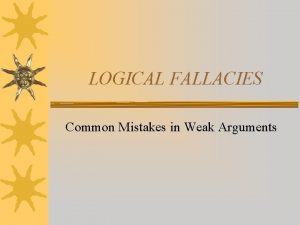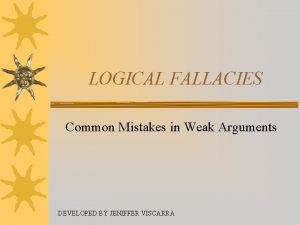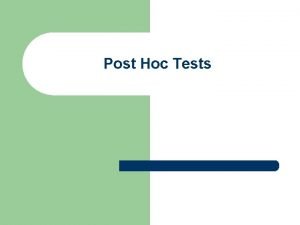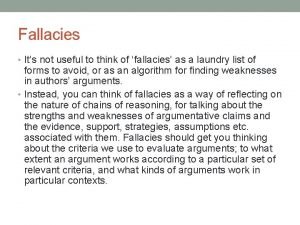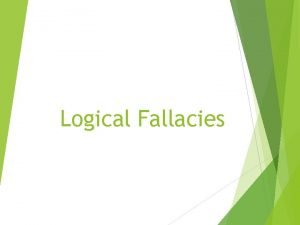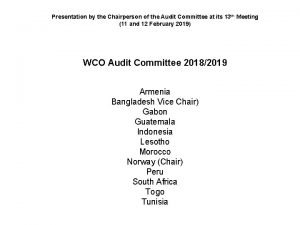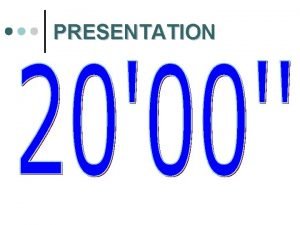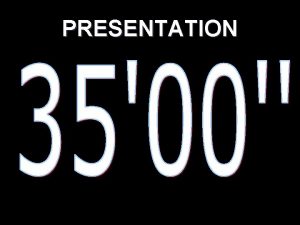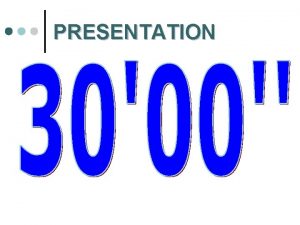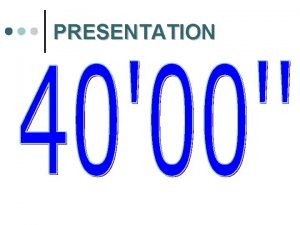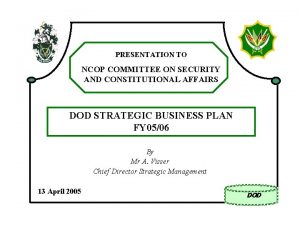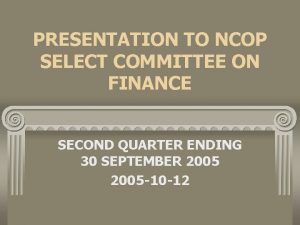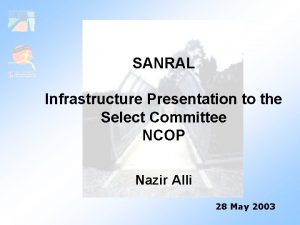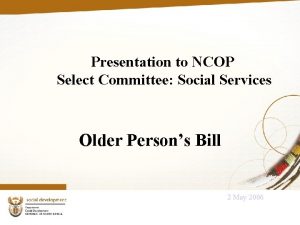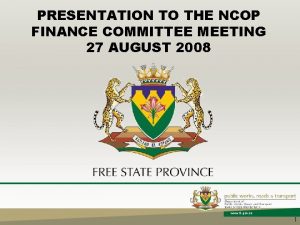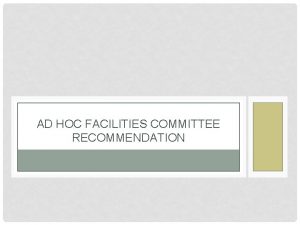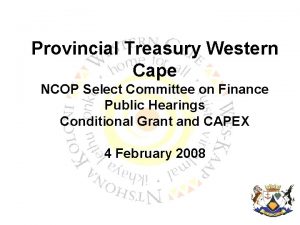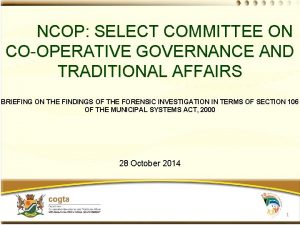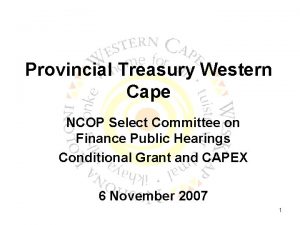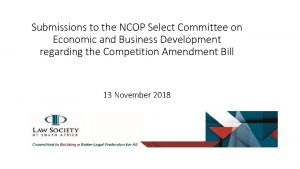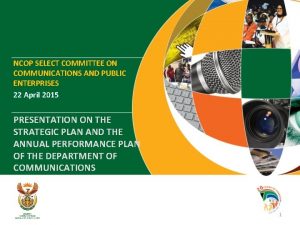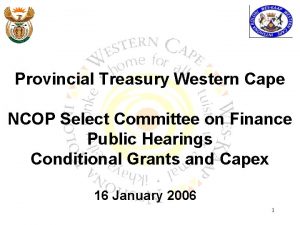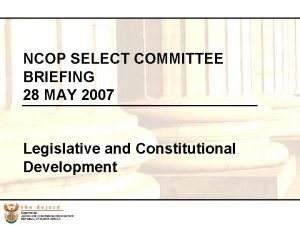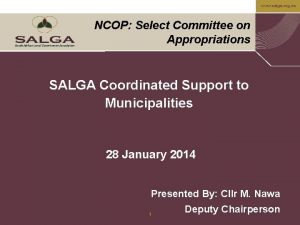Presentation to the NCOP Ad Hoc Committee on




























- Slides: 28

Presentation to the NCOP Ad Hoc Committee on the Funding of Political Parties Electoral Commission 7 June 2018 1

Contents 1. Background and historical context 2. Summary of current challenges 3. International best practice 4. Global guidelines for regulations 5. Core principles 6. Envisaged functional areas 7. Cost estimates for implementation 8. Current realities 9. Collaboration with National Treasury 10. Towards a revised approach 11. Implications 12. Conclusion 13. Questions 2

1. Background: A. Historical Context • Accepting that political parties require funds for all their activities (including campaigning, canvassing, governance and administration and even contesting elections via deposits) the South African Constitution specifically provided for party funding • Section 236: To enhance multi-party democracy, national legislation must provide for the funding of political parties participating in national and provincial legislatures in an equitable and proportional basis • The Public Funding of Represented Political Parties Act (PFRPPA) promulgated on 1 April 1998 provides for this 3

B. Represented Political Parties’ Fund • In accordance with the Act, allocations to political parties are done accordance with a formula: • 10 percent equitable • 90 percent proportional • Total allocations in 2016/17 financial year: R 133 719 172 • National Assembly: • 15 parties received a total of R 120 347 254 • Provincial Legislatures: • 12 parties received a total of R 13 371 917 4

C. Additional forms of public funding • Constituency allowances • Adopted in 1995 and passed as part of the National Assembly’s rules, the constituency allowance is meant to give support to parliamentarians that would enable them to integrate their work inside Parliament with their work outside • Even though South Africa has a proportional system, this provision makes allowance for parliamentarians to maintain constituency offices through this allocation 5

D. Additional public funding • Provincial allocations Province Name of Bill/Act Formula Amount disbursed in 2012/13 or most recent year available Eastern Cape E Cape Political Party Fund Act 100% proportionately R 75 m Free State Political Party Fund Act 100% proportionately R 52 m Gauteng Political Party Fund Act 80: 20 R 58 m Limpopo Political Party Fund Act 100% proportionately R 50 m Mpumalanga Political Parties Support Fund Bill 100% proportionately R 25 m Northern Cape Political Party Fund Act 80: 20 R 22 m North West Political Party Fund Act 80: 20 R 11 m Western Cape Political Party Fund Act 100% proportionately R 29 m 6

E. Private Funding • Currently, private funding is unregulated in South Africa • There is no legislation that compels political parties to disclose the names of persons or organisations that provide donations • No limits with respect to the amount a donor can contribute to a political party over time (election or nonelection periods) • Political parties are allowed to own their own private companies which they use as investment vehicles for the party • Consequently, the public is not informed about where political parties get a large share of their money from and how they spend it. This clearly goes against international praxis, which commonly regulates private income through prohibitions and setting upper limits 7

2. Summary of current situation • No central repository of information regarding public and private funding of political parties • No transparency, regulation or oversight of private funding of political parties • Current RPPF may appear to reinforce the status quo by favouring incumbent and larger parties • Constitutionality of provincial RPPFs? 8

3. International best practice • Global acknowledgement that unfettered and unregulated private funding of political parties has inherent risks • South Africa is a signatory to the United Nations Convention against Corruption (UNCAC) which, amongst others, promotes enhanced transparency in the financing of election campaigns and political parties • South Africa is a also signatory member of the African Union and is in accordance with Article 10 of the AU Convention on Preventing and Combatting Corruption is obliged to adopt legislative measures to ‘incorporate the principle of transparency into funding of political parties’. 9

3. International best practice • Two-thirds of the world’s countries ban foreign political donations to political parties. • Annual contribution limits or limits in relation to the election for parties and candidates exists in more than half on the world’s countries. • 64% of the world’s countries either ban anonymous donations or set a threshold above which the donor’s identity has to be disclosed • Two thirds of the world’s countries also require political parties and/or candidates to make their reports publicly available and commonly both private and public money is included in these reports. 10

3. International best practice Among the current common practices for imposing limits on private funding are: • Increase in equity portion of public funding to assist smaller parties (Mexico uses 70: 30; Ghana 63: 35 with 5% to EMB to cover admin) • Bans on foreign donations (US, UK) • Ban on government funding for parties/candidates (excluding public funding) • Globally, the most common ban on political donations relates to government resources (excluding the provision of regulated public funding). A total of 85% of countries in the IDEA study ban government donations in order to prevent the abuse of state resources 11

3. International best practice • Set election campaign maximum spend limits for parties and/or candidates • Set annual caps/ceilings for party donations overall and for each donor organisation/person (In Mexico political parties may not receive from private funders an amount that is more than 10% of total public funding received by the party) • Require full transparency and disclosure from recipients and donors • Many countries (including Brazil, Burkina Faso, Chile, France, Georgia, Kenya, Portugal) use public funding to encourage gender representivity • Portugal: Parties that do not have a balance between the genders among its candidates can lose between 25% and 80% of its public funding • France: If the gender difference among candidates is larger than 2%, the public funding is reduced by 3/4 of this difference. 12

4. Global guidelines for enhanced regulation The International Institute for Democracy and Electoral Assistance (IDEA) has the following guidelines for regulating private funding of political parties: Regulations should be introduced that…. 1. limit campaign donations and spending and encourage smaller donations 2. provide public funding to political parties including non -monetary support (e. g media access, tax incentives) 3. Balance public and private sources of income for parties and candidates 13

4. Global guidelines cont. 4. Increase transparency: Systematic documentation of party income and expenditure is critical to increase transparency and build public trust in parties and democracy. 5. Provide for compliance and enforcement which talks to the importance of strong and capacitated regulatory authority which is independent from government and political parties. 6. It is important to include civil society organisations and political parties when drafting the legal regulatory framework governing funding of political parties. This enhances trust in the process and stands a better chance of delivering a more credible outcome. 14

5. Core principles: Insulate mandate A. Insulated new mandate 1. There are compelling political, operational and financial reasons for (i) the regulation of party funding and (ii) the management of elections to be distinctly separated Among these are: 1. 1 1. 2 1. 3 2. 3. To insulate the election process from the politics of party funding; To ensure that the political party funding regulatory mandate does not impair the electoral operations mandate and visa versa; and `To ensure that “cannibalisation” of either budget does not occur and to uphold the financial and operational integrity of each process. In operational terms this means the need for the creation of a separate entity with shared governance structures of the Electoral Commission to undertake the political party funding mandate This has been accommodated in Chapter 6 of the Bill 15

5. Core principles: Fully funded B. Separately funded mandate 1. 2. Taking the above mentioned factors into account there is a need to determine the availability of funding for the new entity. The Electoral Commission will not be able to use a portion of its baseline allocations for this purpose due to the following reasons: 2. 1 2. 2 2. 3 The present budget appropriations to the Electoral Commission are based on its current legal mandate and are intended to prepare and conduct the national and provincial elections in 2019; The ruling of the Constitutional Court regarding the voters’ roll has resulted in a significant additional financial burden on the Electoral Commission The baseline allocations for the current financial year have been reduced by National Treasury Together these have resulted in a shortfall of over R 325 million funding for the Electoral Commission in the 2018/19 financial year 3. Throughout the development of the draft legislation process to date, the Electoral Commission has consistently stressed that it cannot assume an unfunded mandate 16

5. Core principles: Additional skills C. New skills 1. 2. The present bill expands the scope of the party funding mandate beyond the present skills and expertise New skills and competencies will need to be recruited in order to perform the functions contemplated in the bill. These include: 2. 1 Investment management and planning; 2. 2 Investigations and enforcement; 2. 3 Party funding research and policy development and 2. 4 Fund raising 17

6. Envisaged: Functional Areas The following key functional areas have been identified (NOTE: This is not an organogram/structure) 18

7. Envisaged Costing: Personnel Costing 1. The proposed costing for the start-up comprises of R 11 million in personnel expenditure as follows: Position Type No. of positions 1 Salary Package R 1, 828, 516 Senior Manager (level 14) 3 R 1, 524, 899 R 4, 574, 697 DM (level 12) 1 R 1, 060, 537 AM (level 10) 1 R 737, 582 SAO (level 8) 1 R 512, 974 AO (level 7) 2 R 427, 793 R 855, 586 CEO (PERSAL level 15) SUBTOTAL ADD 10% non-salary personnel expenses Total R 1, 828, 516 R 9, 569, 892 R 956, 989 TOTAL R 10, 526, 881 ROUNDED OFF R 11, 000 19

7. Envisaged Costing: Admin 2. In addition it is estimated that approximately R 34 million would be required for administrative expenses and assets as follows: 20

8. Current realities There is an urgent need for party funding regulation 1. 2. 3. South Africa remains one of only a few countries which currently does not regulate party funding Transparency and regulation of party funding is an important aspect of free and fair elections and in the combatting of corruption With the next national and provincial elections scheduled for 2019 it would be a lost opportunity not to have some reporting system in place for party funding ahead of the elections But there is limited time and limited resources 1. 2. 3. 4. 5. There are currently no systems, processes or regulations in place and these will have to be developed The skills necessary for this work do not currently exist within the Electoral Commission and its current budget is already constrained The economic conditions are constrained resulting in limited funding within the public sector and for political parties Implementing a new regulatory regime for party funding will require additional resources by both the public sector and political parties in order to comply Funding for this can only be made available once the legislation is approved and enacted 21

9. Collaboration with NT 1. To seek a way forward regarding the funding requirements proposed above, a meeting was held between the Electoral Commission and National Treasury officials in March 2018. 2. During this engagement the following areas of agreement and consensus emerged: 2. 1 2. 2 2. 4 2. 5 The proposed budget of R 45 million was unaffordable within the current fiscal constraints and National Treasury was of the view that R 20 million might be a more feasible amount The funds can only be allocated after the due parliamentary process and enactment of the legislation by the President The eventually approved allocation would be through MTEC process which has closed for the current year It was proposed that the implementation be done in a phased-in approach with certain aspects of the legislation prioritised. This would also further reduce the costs. 22

10. Towards a revised approach 1. In view of the many unknown factors in the first year of implementation of the provisions of the envisaged new act, the following is proposed: 1. 1 A phased-in approach be followed in implementing the requirements of the bill using only a skeleton staff complement; 1. 2 It is proposed to prioritise the following aspects of the draft legislation ahead of NPE 2019: 1. 2. 1 Implementation of Represented Political Party Fund; 1. 2. 2 Establishment of the Multiparty Democracy Fund; 1. 2. 3 (Limited) Annual reporting and disclosure by political parties of all resources and amounts of direct funding to the Electoral Commission; 1. 2. 4 Research and policy development. 23

10. Revised approach 1. This would mean the Electoral Commission could prioritise the areas of Party Funding Management and Policy & Regulatory Affairs within the period ahead of NPE 2019: 24

11. Revised Approach: Costing Expenditure Category Description Personnel expenditure All inclusive remuneration packages 5, 500, 000 11, 550, 000 Administrative expenditure Office rental Telecommunications Subsistence and travel (incl international) Advertising Conferences and workshops Printing and stationery Repairs and maintenance Audit costs Storage Professional and other services Subscriptions and membership fees Domestic requirements and meals on premises 3, 000 1, 000 25, 000 3, 150, 000 1, 050, 000 26, 250 3, 307, 500 5, 000 2, 000 1, 000 500, 000 1, 515, 000 250, 000 5, 000 2, 000 1, 000 500, 000 3, 000 10, 000 250, 000 5, 250, 000 2, 100, 000 1, 050, 000 525, 000 3, 150, 000 10, 500, 000 262, 500 20, 000 94, 500 60, 000 20, 000 60, 000 75, 000 60, 000 20, 000 15, 000 70, 000 240, 000 110, 000 60, 000 45, 000 - 20, 000 37, 785, 000 39, 015, 750 Assets Computers/ Laptops Printers Heavy duty copier Shredder Office desks Chairs Boardroom furniture Storage cabinets Credenzas Total start-up budget requirement Amount R 2018/19 Amount R 2019/20 Amount R 2020/21 25

12. Implications 1. National Treasury will need to provide a minimum amount of R 20 million in 2018/19 for the establishment of a skeleton party funding unit 2. Thereafter it is estimated that R 38 million and R 39 million respectively will be required in subsequent years 3. The limited resources during the first phase of implementation (2018/19) will require a phase-in application of certain chapters, clauses and provisions of the legislation in line with the development of regulations and capacity of the new unit (e. g. postpone the compliance and enforcement functions. ) 4. The proposal to prioritise certain aspects of the proposed new legislation will have to be agreed to politically and the phased implementation must be made clear in the legislation and promulgation process 26

13. Conclusion 1. The Electoral Commission remains committed to implementing the new party funding legislation when approved and enacted. However, there is a high likelihood that: 1. 1 1. 2 1. 3 the final legislation will only be approved and enacted towards the latter part of 2018; while the legislation provides an over-arching framework, considerable work must still be done to develop regulations to empower the implementation of the legislation funding for the start-up of the new entity will only be made available towards the end of the year or early 2019 political parties and the Electoral Commission will be consumed with preparations of NPE 2019 over the next year and specifically during the first quarter of 2019 We therefore need to be realistic and reasonable in expectations of how quickly and how much of the new legislation will be able to be implemented ahead of NPE 2019 27

Thank you and Questions 28
 Post hoc ergo propter hoc fallacy
Post hoc ergo propter hoc fallacy Hic haec hoc chart translation
Hic haec hoc chart translation Post hoc fallacy
Post hoc fallacy Post hoc ergo propter hoc
Post hoc ergo propter hoc Strawman examples
Strawman examples Post hoc ergo procter hoc
Post hoc ergo procter hoc Denying the antecedent fallacy
Denying the antecedent fallacy Post hoc ergo proter hoc
Post hoc ergo proter hoc P&t committee presentation
P&t committee presentation Audit committee presentation
Audit committee presentation Loan committee presentation
Loan committee presentation Swe finance
Swe finance Thiếu nhi thế giới liên hoan
Thiếu nhi thế giới liên hoan So nguyen to
So nguyen to Tia chieu sa te
Tia chieu sa te Các châu lục và đại dương trên thế giới
Các châu lục và đại dương trên thế giới Một số thể thơ truyền thống
Một số thể thơ truyền thống Thế nào là hệ số cao nhất
Thế nào là hệ số cao nhất Sơ đồ cơ thể người
Sơ đồ cơ thể người Tư thế ngồi viết
Tư thế ngồi viết Hát kết hợp bộ gõ cơ thể
Hát kết hợp bộ gõ cơ thể đặc điểm cơ thể của người tối cổ
đặc điểm cơ thể của người tối cổ Cách giải mật thư tọa độ
Cách giải mật thư tọa độ Chụp tư thế worms-breton
Chụp tư thế worms-breton ưu thế lai là gì
ưu thế lai là gì Thẻ vin
Thẻ vin Thể thơ truyền thống
Thể thơ truyền thống Cái miệng bé xinh thế chỉ nói điều hay thôi
Cái miệng bé xinh thế chỉ nói điều hay thôi Các châu lục và đại dương trên thế giới
Các châu lục và đại dương trên thế giới
